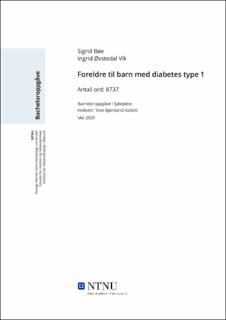| dc.contributor.advisor | Vadset, Tove Bjørnland | |
| dc.contributor.author | Bøe, Sigrid | |
| dc.contributor.author | Vik, Ingrid Øvstedal | |
| dc.date.accessioned | 2020-07-16T16:02:33Z | |
| dc.date.available | 2020-07-16T16:02:33Z | |
| dc.date.issued | 2020 | |
| dc.identifier.uri | https://hdl.handle.net/11250/2669383 | |
| dc.description.abstract | Bakgrunn: Diabetes mellitus type 1 er ein utbreidd diagnose hjå barn. Antall nye tilfelle av diabetes i Noreg har fordobla seg dei siste 30 åra og Noreg er eit av landa i verda med flest tilfelle av diabetes mellitus type 1 hjå barn.
Hensikt: Undersøkje korleis foreldre til barn med diabetes type 1 erfarer sjukdomen og kvardagen.
Metode: Ein systematisk litteraturstudie basert på 8 forskingsartiklar, faglitteratur og eigne meiningar.
Resultat: Foreldre opplever ulike emosjonelle reaksjonar, både ved diagnosetidspunkt og vidare i sjukdomsforløpet. Det er viktig med tilpassa informasjon og kommunikasjon, ut ifrå foreldra sine behov og ynskjer. Vidare er det gunstig for foreldre og barn, at mor og far er like involverte i behandlinga. Aleineforeldre har god effekt ved bruk av meistringsstrategiar.
Konklusjon: Mange foreldre kjende på stress, angst, sorg og nedsatt velvære. Ved at sjukepleiar har kunnskap om dette, kan desse reaksjonane reduserast. God profesjonell kommunikasjon er viktig for å gjere kvardagen enklare. Det vil skape tillit mellom sjukepleiar og foreldre. Sjukepleiar må vise positivitet til at begge foreldra deltek i behandlinga.
Nøkkelord: Barn, foreldre, diabetes mellitus type 1, opplever | |
| dc.description.abstract | Background: Diabetes type 1 is a widespread diagnosis among children. The number of new cases has been doubled within the last 30 years. Norway is one of the countries with the highest number of cases of diabetes among children.
Objective: Investigate how the parents of children with type 1 diabetes experience the disease and their every-day-life.
Methods: A compiled systematic literature review based on 8 research studies, literature and own opinions.
Results: Parents experience various emotional reactions, both in time of the diagnosis, and further in the disease course. Adapted information and communication based on both parents’ wishes and needs are key attributes in the overall process. It is further favourable for parents and children, that both parents are equally involved in the treatment. Coping strategies will benefit single parents.
Conclusion: A high percentage of parents experienced stress, anxiety, grief, and reduced well-being. Evidently, emotional reactions may be reduced when communicated to the nurse as professional communication may relieve the burden and make the every-day-life easier. This will strengthen trust between the nurse and parents. A positive attitude on the nurses’ behalf towards all parents participating in the treatment is crucial.
Keywords: Children, parents, diabetes mellitus type 1, experience | |
| dc.publisher | NTNU | |
| dc.title | Foreldre til barn med diabetes type 1 | |
| dc.type | Bachelor thesis | |
